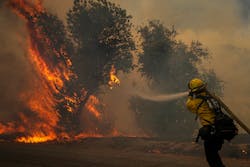Author of Climate Impact on CA Wildfires Study Admits Leaving Out the Full Truth
SAN JOSE, Calif. — A new study by a team of mostly San Francisco Bay Area scientists that found human-caused climate warming has increased the frequency of extremely fast-spreading California wildfires has come into question from the unlikeliest of critics — its own lead author.
Patrick T. Brown, climate team co-director at the nonprofit Breakthrough Institute in Berkeley and a visiting research professor at San Jose State University, said his Aug. 30 paper in the prestigious British journal Nature is scientifically sound and “advances our understanding of climate change’s role in day-to-day wildfire behavior.”
But Brown this week dropped a bomb on the journal — as well as his study’s co-authors who are staunchly defending the team’s work. In an online article, blog post and social media posts, Brown said he “left out the full truth to get my climate change paper published,” causing almost as much of a stir as the alarming findings themselves.
Brown wrote that the study didn’t look at poor forest management and other factors that are just as, if not more, important to fire behavior because “I knew that it would detract from the clean narrative centered on the negative impact of climate change and thus decrease the odds that the paper would pass muster with Nature’s editors and reviewers.” He added such bias in climate science “misinforms the public” and “makes practical solutions more difficult to achieve.”
On Thursday, Nature shot back. “When it comes to science, Nature does not have a preferred narrative,” Editor in Chief Magdalena Skipper wrote in a statement to the Bay Area News Group.
She offered some recent examples of Nature articles including one noting various factors that drive wildfire destruction of towns that she argued “do not follow the purported editorial biases alleged by Brown,” who was the lead author in two other studies published by Nature and a third in its affiliated climate change journal.
“We are now carefully considering the implications of his stated actions,” Skipper said of Brown. “Certainly, they reflect poor research practices and are not in line with the standards we set for our journal.” Nature said post-publication review can lead to clarifications or an editorial statement of concern about a paper’s integrity.
Skipper added that peer reviewers had raised questions about variables other than climate change missing from Brown’s study, but the authors argued against including it, a claim Brown has disputed in a social media responses.
Brown said all decisions about shaping the research to appeal to Nature’s editors were his, not his co-authors, at least some of whom he said he gave a head’s up to before publishing his journal critique. The other co-authors are affiliated with the San Jose State’s Wildfire Interdisciplinary Research Center, the University of California, Berkeley, UC Irvine and Pacific Gas & Electric Co.
Co-author Steven J. Davis, a UC Irvine Earth science professor, said he “wasn’t involved in strategic decisions to exclude factors from the study,” and that Brown’s comments “took me by surprise.” He said “we don’t know whether a different paper would have been rejected.”
“I don’t think he has much evidence to support his strong claims that editors and reviewers are biased,” Davis said. “Keeping the focus narrow is often important to making a project or scientific analysis tractable, which is what I thought we did. I wouldn’t call that ‘leaving out truth’ unless it was intended to mislead — certainly not my goal.”
Co-author Craig Clements, director of San Jose State’s wildfire research Center, said “the scientific work done in this paper is robust, utilizing cutting-edge techniques and tools — most notably artificial intelligence models — and it is an important study that provides crucial data and advances our understanding of wildfire behavior.”
“I recognize journals such as Nature, one of the most respected science publications in the world, have rigorous editorial processes and appreciate the fact that they saw the value of the important science that this study advances,” Clements said.
San Jose State said in a statement that “the study’s lead author expressed his opinion about the peer review process, which has no impact on the validity of the work.”
In the study, the researchers used artificial intelligence to learn the relationship between temperature and wildfires to gain a fresh understanding of how heat influences fire activity. They focused on daily fire growth of 10,000 acres or more in a day, enough to capture extreme fires that expanded quickly, but were frequent enough to study. They looked at 380 extreme-growth fires from 2003 to 2020 and estimated human-caused warming increased frequency of extremely fast-spreading California wildfires by 25%, and that extreme wildfire days would increase by the end of the century even with stringent reduction of emissions.
The paper acknowledged in its findings that “temperature is only one of the dozens of important variables that influences wildfire behavior,” but said it is “most directly related to increasing greenhouse gas concentrations.”
Brown said he’s turned down interview requests this week from media outlets he felt were eager to cast climate change as a hoax — “that’s not an argument I want to make at all.”
He said he left his faculty job at San Jose State in the spring of 2022 for Breakthrough, cofounded by East Bay author Michael Shellenberger, who has criticized the environmental movement’s leeriness of nuclear energy and ran twice for governor as a Democrat and independent.
The career change, Brown said, gave him freedom to critique the academic system and its publish-or-perish incentives that he says undermine sound science. He said he’s now doing research that considers the impact of climate change in conjunction with proposed reforms to forest management practices over the next several decades.
“I’ve gotten mostly positive feedback” on the critique of academia, Brown said, “but blowback as well.”
_____
©2023 MediaNews Group, Inc. Visit at mercurynews.com. Distributed by Tribune Content Agency, LLC.
